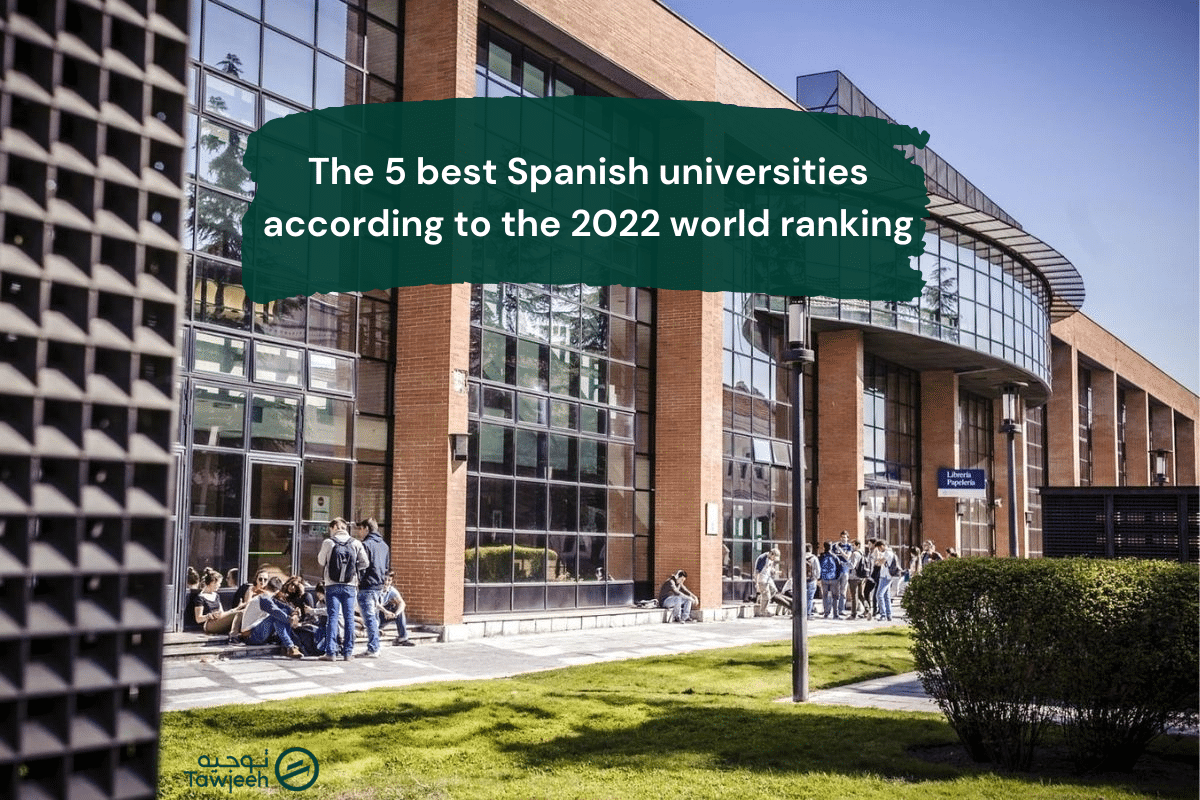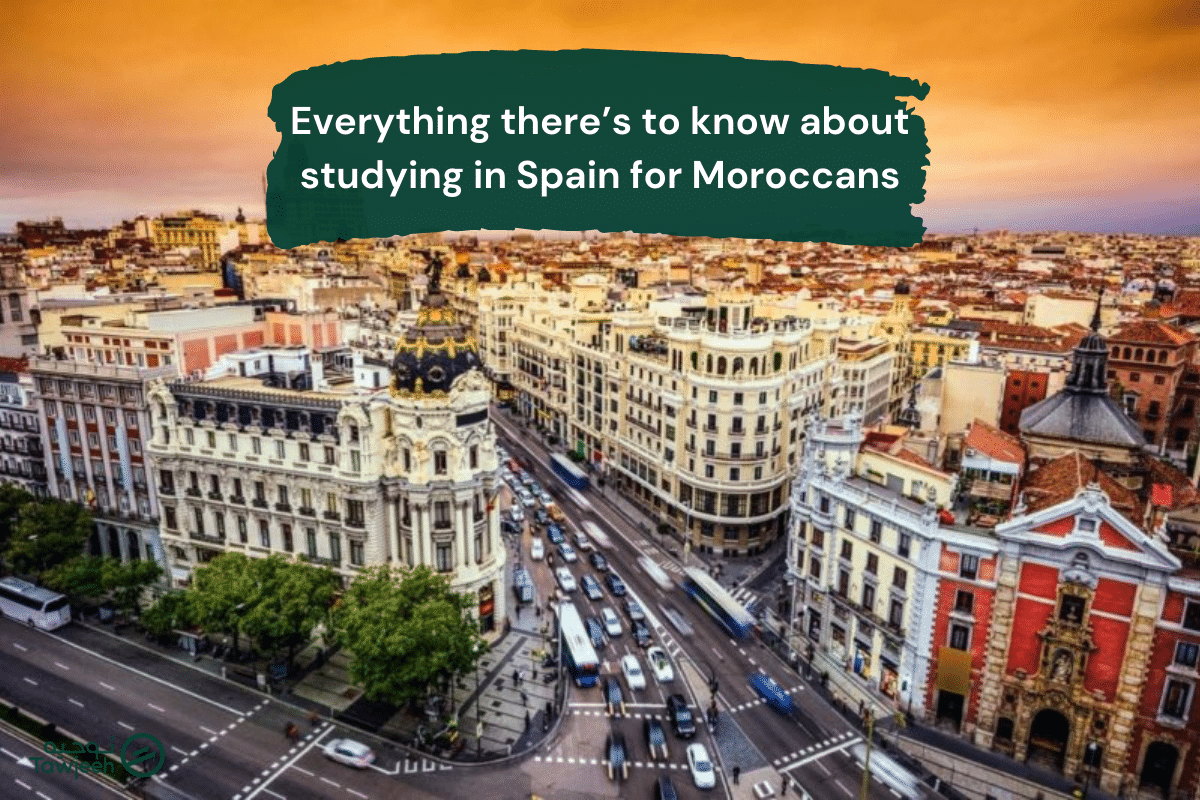7,6% of students studying in Spanish universities are foreigners who chose to study there.
Here’s 3 programs you can study in Spain;
- Learning the Spanish language;
- Professional courses;
- Studying a specific field at university.
Before diving into details about these study programs in Spain, here’s 3 advantages to studying in this country;
- Studying majors in the English language;
- The PCE exam;
- Getting a scholarship or a financial aid from the Spanish government.
- Living the Spanish experience that differs from other European countries.
1/ Learning the Spanish language:
The preparatory year for studying Spanish is immensely important as it:
- Opens the doors for acceptance from public universities that are known worldwide and whose fees are relatively low;
- Facilitates integration and enhances social life in Spain without communication problems;
- Offers big opportunities in finding work easily.
Enrolling at Spanish universities and more specifically public universities requires the student to have learnt at least 6 months of Spanish language at one of the language centers recognized by Spanish universities.
-
Why is it important that the student does more than 6 months of language?
Generally, 6 months is the necessary period to learn the language in a way that will render studying a specific course in university possible.
Moreover, receiving the student’s card after arriving in Spain permits free movement in the country without the need for a passport.
The student’s card validity date can stretch up to a year even if the language studying period is only 8 months for example.
-
What are the entry exams required for studying at Spanish universities?
The SELECTIVIDAD exam represents the second step taken by students to enter universities in Spain after the baccalaureate equivalence.
The Moroccan baccalaureate equivalence is therefore the first step to pursuing studies in Spain. Without it, registering in Spanish schools is not possible.
As it is, Spanish universities don’t take into consideration the Moroccan baccalaureate without equivalence.
-
What’s the baccalaureate equivalence?
It is the process of changing the original baccalaureate into a baccalaureate accepted in the country of studies that the student chose.
The baccalaureate equivalence documents are transferred to the Spanish Embassy in Rabat. (Number 9, Marrakech Street, Rabat,)
-
What are the necessary documents?
- The passport;
- A copy of the ID;
- Grades report of the first and the second year of the baccalaureate;
- The baccalaureate certificate;
- Passeport ;
- Legalizing the documents at the prefecture;
- Translating the documents in Spanish;
- Authentication of the documents at court after their translation
- A transfer of 5430 dirhams.
This operation takes from 3 to 5 months. Therefore, it is advisable for the student to do it before the start of the deadlines regarding registration in Spanish universities.
2/ SELECTIVIDAD exam:
It’s the exam that renders possible the entry to a Spanish university for the student to study his major of choice.
Indeed, apart from studying the language, the PCE exam is one of the requirements for accessing public and some private universities in Spain.
The PCE exam, also called Selectividad, is a simple test similar to those demanded in other countries, like the YOS test in Turkey. The courses taken in the exam depend on the field of study.
It is to be reminded that the PCE test is considered one of the fastest ways to study in Spain.
- What’s the accepting rate of Spanish universities?
The PCE grade needed changes depending on the major of study wanted.
For example:
If the student desires to study medicine, he has to get an average of 9/10.
For economics and management fields, an average of 5/10 is sufficient for access.
The third study program to do in Spain is:
3/ Vocational training:
Vocational training courses taught at Spanish establishments are based on a pedagogy reinforced by practice more than theory, but also field practice.
Let’s see the types of vocational trainings in Spain:
- What type of vocational trainings can we find in Spain?
There are 4 types:
-
Grado Superior Ordinario :
This course lasts two years; a theorical period of one year and 6 months, and a practical period of 3 months.
2. Grado Superior Dual :
This course lasts two years as well. But it differs from other courses as its practical period equals the theorical one.
(One year of learning theory, and one year of practice, when the student can do an internship at a Spanish company).
3. Grado Superior Doble Titulación:
This course lasts 3 years. (Two years theory and one year practice).
This course offers the student at the end of his training two certificates rather than one, which gives him more chances of finding a job.
However, the accepting rate in this training is really low because the institute qualified to teach it gives access only to a limited number of people to register at the beginning of each academic year.
4. Grado Superior a distancia / online:
This type of training is done online and offers many specificities.
- Why is vocational training a better option than studies in Spain?
5 reasons to choose vocational training:
- The student doesn’t need to have the Selectividad certificate;
- The study period is short + there’s practical experiences in the field;
- Getting hired after obtaining the diploma is very easy;
- Doesn’t require a very good level of Spanish language;
- The vocational training fees are lower than that of universities.
(Fees in Barcelona or Madrid are an average of 400 euros)
- What you need to register in vocational training:
They’re simpler conditions than registering in Spanish universities.
All the student needs is:
- The baccalaureate equivalent;
- The student’s passport;
- A good Spanish level.
4/ studying a specific major in a Spanish university:
After having studied and mastered the Spanish language, then passed the PCE test, the student can register in the Spanish university where he’s going to study the major of his choice.
Spain has a variety of universities, public and private. One of them represents the third oldest university in Europe which is Salamanca University. It’s important to know that most of these universities are internationally known for the quality of their teaching, and that 23 of them are part of the QS world university rankings.
Down is the list of the 5 best universities in Spain:
-
Barcelona University:
Barcelona University first on the ARWU list of 2020 and is one of the largest and most prestigious Spanish universities. Its most popular majors are medicine, archeology and philosophy.
2. Autonoma University of Madrid :
UAM university offers multiples courses in the English language for international students who don’t speak Spanish, the general teaching language.
The university proposes multiple cultural and sport activities that play a major role in the increasing number of foreign students that study there.
3. Pompeu Fabra University :
This university has the particularity of a mixed teaching, which is an alternation between studying semesters online and studying semesters in person.
4. Complutense University of Madrid :
Complutense University is distinguished by its international plusses. Assuredly, the university participates in many European Union programs (like Erasmus). It is renowned for its majors in medicine, dentistry but also veterinary.
5. Autonoma University of Barcelona :
the QS world university rankings puts Autonoma University of Barcelona as the second-best university in Spain and 176th in the world.
Documents and conditions for enrolling in Spanish universities:
- Spanish language diploma;
- Passport;
- Photo;
- Baccalaureate equivalent + PCE test.
Months when to register for studying in Spain:
- January;
- September;
- March.
-
What happens after choosing the university and passing the language test?
The student will need to find who and to who present all his documents and wait for the university’s answer.
-
What is the simplest way to get a visa for Spain?
- Having studied Spanish;
- Having prepared the PCE exam.
As the language is one of the most important conditions to study and live in Spain, its process isn’t as complicated as registering for a university program.
Adding to that the students that learned the language in Morocco and wish to go prepare their PCE exam in Spain.
Conditions to obtain the Spanish student’s visa:
- Having contacted one of the universities or institutes in Spain and received an official acceptation to study there;
- A document proving that all fees required by the university were paid;
- A motivation letter where the student presents himself and reveals the reasons he wants to study in Spain;
- The baccalaureate equivalent that the student obtained from the Spanish embassy in Morocco,
- Spanish language.
In order to get a student’s visa, it’s necessary to have certain documents that we can divide into three categories:
-
Documents concerning university:
- Acceptance letter ;
- University documents (timetable, course program).
2. Personal documents:
- Personal photo;
- Passeport ;
- Certificate of good behavior;
- Baccalaureate equivalent.
3. Documents for guarantee:
- Bank account summary consisting of living money only, no less than 5500 dirhams a month for the entire period the student will be in Spain;
- Bank account summary consisting of the school fees;
- Document proving that the student has a place to stay in after his arrival (rental of an appartement, hotel)
Documents required for a visa in detail:
- Copy of document containing all necessary information saved from the Spanish Embassy website, with the receipt of the visa fees paid;
- Passport which validity date is over 6 months and with at least two pages empty;
- If the student wishes to pass the baccalaureate exam, he needs to present his high school certificate;
- Certificate of good behavior;
- Medical certificate obtained from one of the medical centers recognized in Spain.
- With this, we will have presented you with the complete guide about studying in Spain.








